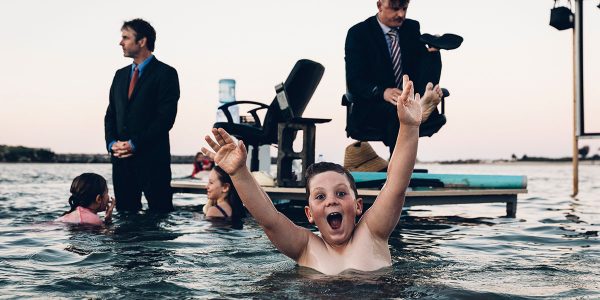Words from The Farm: Gavin Webber speaks about climate change, leadership and art making

with Renee Newman
Remember the extraordinary Cockfight? Two men battling it out in one of Australia’s best physical theatre works of recent years. We asked Gavin Webber of Gold Coast based live performance company The Farm to reflect on how concerns about climate change, and ideas of ‘green’ leadership, have influenced their artistic practice and work:
The Farm are a group of artists and designers driven by issues that concern us all and there can be no greater problem we face at the moment than climate. Our approach to working outdoors has always been to juxtapose something with the natural landscape and to put the human figure at the base of the enormity and power of nature. In 2018 we performed on the beach for a show called The Ninth Wave. In that show the sand became a flood and there was a highway underneath it, the only objects were cars poking out, lamp posts half buried and an old petrol sign. We didn’t try to compete with the environment but instead used it to show how fragile and at risk we really are.
The Farm has its roots way back in the days of Meryl Tankard and Australian Dance Theatre. That was in the 90’s for those of us who can think that far. We also have a lot of history in Europe, especially Germany, so the biggest change for us was relocating our work to the Gold Coast. There we intersected strongly with the environment, simply because it’s impossible to ignore, and because we started working with Bleach Festival, who do a lot of outdoor events. We decided that we should put ourselves in the place where everyone goes, rather than expecting them to come to the theatre to see us. The first thing we ever did landed us on a sandbar in Currumbin Creek for 48 hours, in an office we constructed without walls. We sold real estate out there, improvised to music being played from shore, dealt with the rising tide, lived off food (and coffee! So much coffee) brought to us by concerned locals and somehow avoided being eaten by sharks. That piece was called TIDE, it landed a Helpmann in 2018 when we repeated it and it was our first foray into the theme of climate change and the environment.
I think sustainability points to having a future. As simple as that. For too long we’ve acted as though we can dominate nature, rather than respecting it. It seems a particularly obsolete view yet we hang onto it, thinking that science will solve our problems even at the same moment that we ignore the calls of scientists to act. Sustainability to me means change. Change our lives, change our views, change our structures. A leader in this is someone that is willing to make a change.
We have battled with how the arts and artists can be Green Leaders. The shows we have made, such as TIDE and The Ninth Wave, where we dealt directly with the issue of climate change, all had footprints. We had to run a generator for these outdoor works and we deliberated over the value of art in general as an agent to provoke change. I still believe art has the potential to reach people in a way that polemical discussion can’t. It finds the cracks in a person’s armour and infiltrates their thinking, sometimes without them even knowing. So we came out with the conviction that putting on these shows is not just a vanity exercise. We know how to reach people emotionally and physically, how to make them think and feel, and we still believe that’s a valuable contribution to make.
Still the question is even more complex than that. For a long time our goal as a company was to tour and I think we need to really question this. I’ve started wondering what a show looks like that performs live but has impact beyond so it doesn’t need to tour. TIDE was a great example. People could interact with it in many ways. they could step into our sunken office and join our improvisation, they could watch from the safety of the shore, they could see it from the highway or they could watch it through social media. And like a good test match, they could just check in occasionally. “Yep, still there. Still no shark.” I met people in Perth afterwards who told me they really loved the work, as if they’d seen it, but they hadn’t. They’d engaged with it online and the concept still worked for them. Maybe there’s an answer there somehow. Making work that is performed local live and farmed out across the internet.
Image: Tide, Kate Holmes